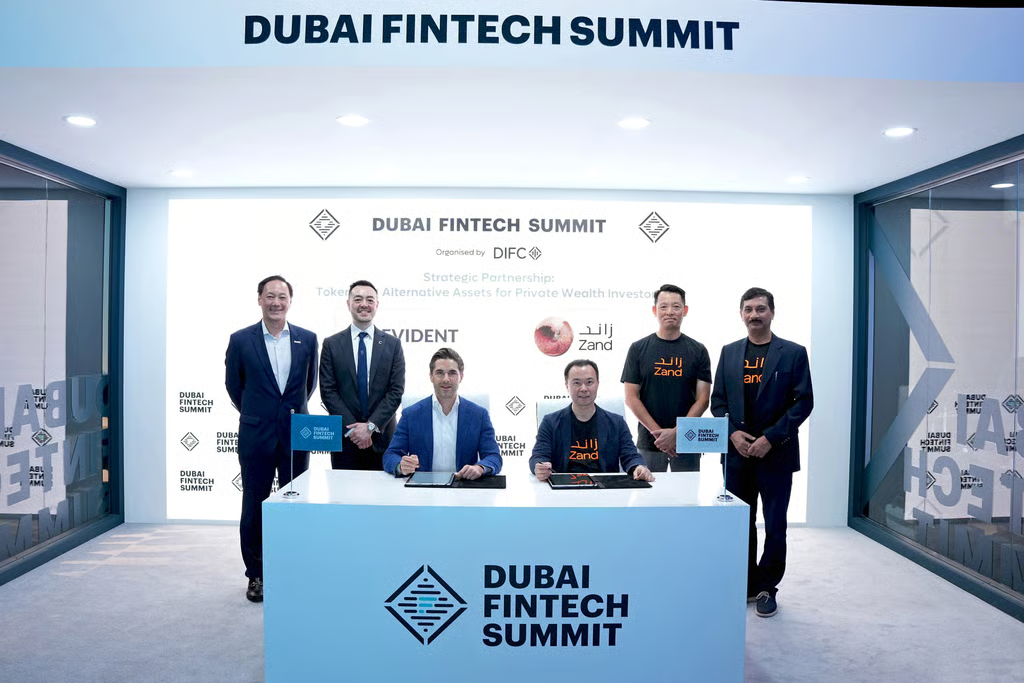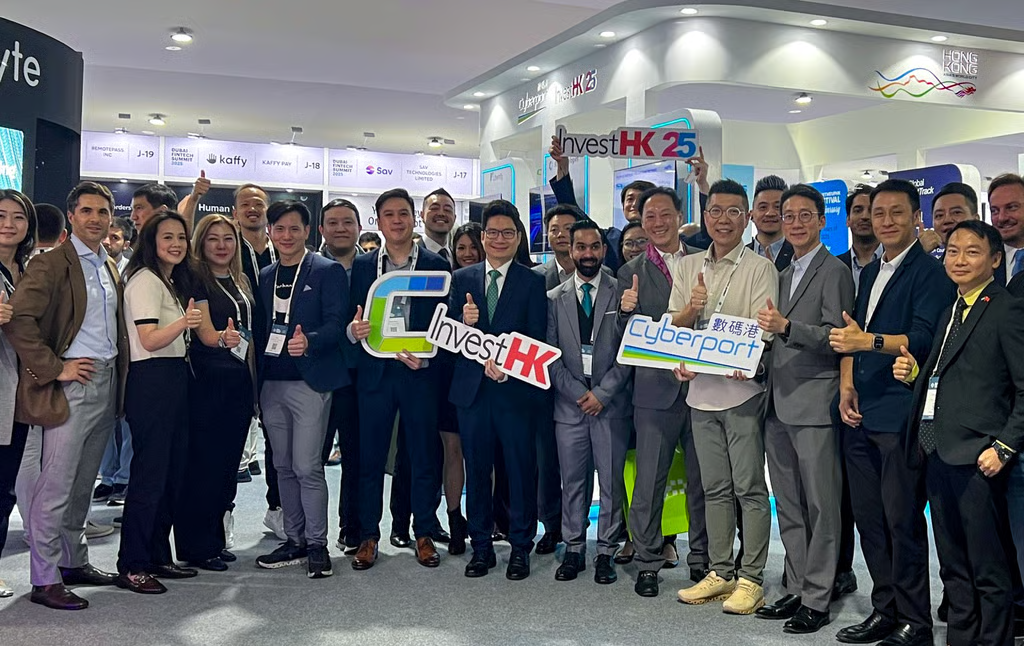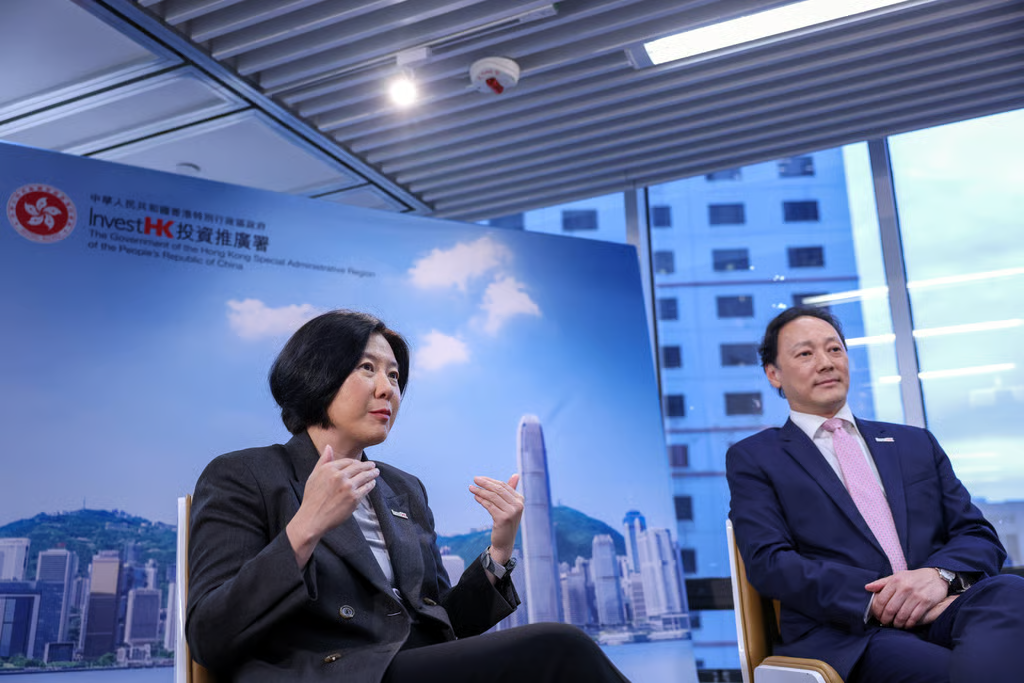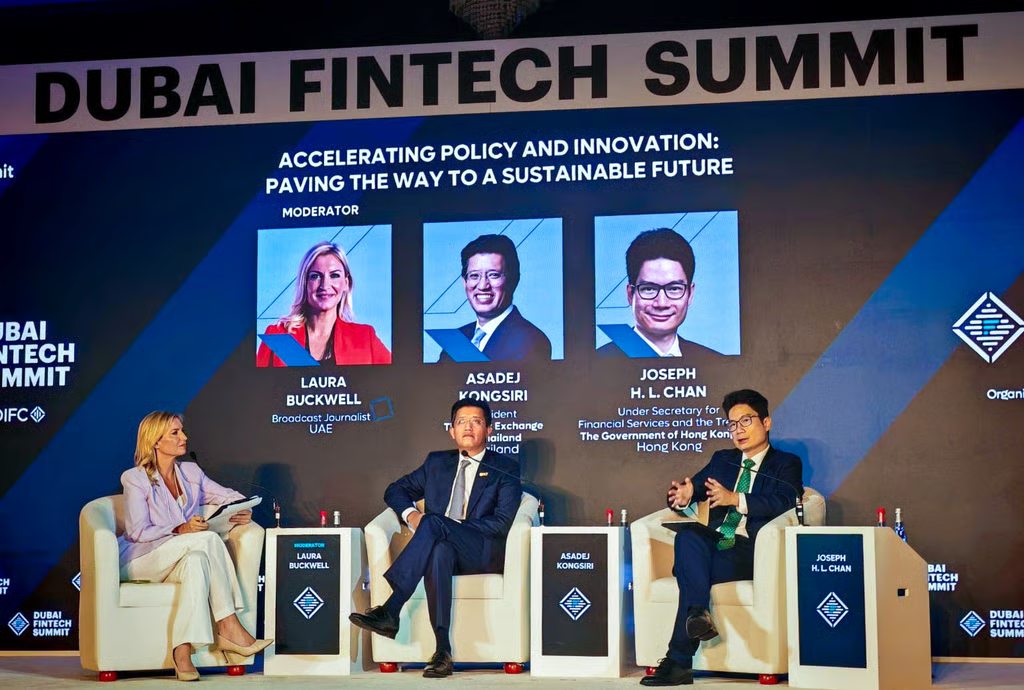After 25 years promoting the city as an investment destination, InvestHK is now championing Hong Kong companies’ overseas expansion

On May 16, just as US President Donald Trump wrapped up his whirlwind Gulf tour with over US$2 trillion in deals, a little-known Hong Kong fintech firm beat global rivals to bag a contract with a United Arab Emirates (UAE) bank.
Evident Group, operator of a digital investment platform for alternative assets and licensed by the Securities and Futures Commission, formed a partnership with Zand Bank, the UAE’s first fully licensed digital bank. The collaboration will provide the Dubai-based bank’s clients with investment opportunities through Evident’s tokenisation technology and infrastructure.
The partnership was made possible thanks to the efforts of InvestHK. And Evident’s success exemplifies the investment promotion agency’s new mission. After a quarter-century dedicated to attracting global investment to Hong Kong, InvestHK is transforming into a business development agency that leverages the city’s dual role as both a “superconnector” and “super value-adder” to help companies succeed.
“We must now help them take the next step in their journey to be successful,” said Alpha Lau Hai-suen, the Director General of InvestHK. “Whether they are from China or from Asia or elsewhere, once they open in Hong Kong, we see them as a Hong Kong company, so we will help them.”

(From left) King Leung, Global Head of Financial Services, Fintech and Sustainability at InvestHK; Victor Yim, Head of Fintech at Cyberport Hong Kong; Florian Spiegl, Founder and CEO of Evident Group; Ronald Fok, Head of Wealth and Asset Management at Zand Bank; Michael Chan, CEO of Zand Bank, and Parag Gupta, COO of Zand Bank. Photo: Handout
This strategic shift responds to evolving challenges. InvestHK was established in 2000 to retain foreign investment amid rising competition. A pivotal moment came in 2001 when China joined the World Trade Organization, prompting many firms to bypass Hong Kong for direct mainland access. But now companies want to expand, taking advantage of Hong Kong’s credibility and regulations.
Evident’s founder Florian Spiegl appreciated InvestHK’s role in bringing the partnership with Zand to fruition. He said this was only possible after InvestHK arranged an informal meeting with Zand’s CEO, Michael Chan, which gave him an opportunity to share his vision. This, in turn, helped speed things up.
“I vividly remember standing in the corner of a room waiting to talk to him,” the Austrian said. “I walked up to him and immediately started talking about the company.” Normally, securing such a meeting would have taken him a year to arrange, he added.
Zand Bank will use Evident’s digital market infrastructure, enabling the bank’s clients to access alternative investments like private credit and infrastructure in tokenised format, according to Spiegl.
“For example, they may have clients who are interested in Chinese pre-IPO [initial public offering] companies or private companies; we can help these firms expand their product offerings in alternative assets, making it easy for the bank to serve its clients,” Spiegl said.
In the long run, the two sides could eventually integrate their operations at an infrastructure level, he added.
“Their vision for digital transformation aligns perfectly with our own mission to make institutional-grade alternative assets more accessible through secure, cutting-edge digital infrastructure, so essentially we can integrate,” said Spiegl, a finance veteran who co-founded FinFabrik, a blockchain technology company that was acquired by Hunter Technology in 2020 for US$12 million.

Members of the Hong Kong delegation that visited the Gulf last month. Photo: Handout
The Hong Kong delegation’s UAE leg of the tour coincided with Trump’s. The contingent was led by Joseph Chan, Under Secretary for Financial Services and the Treasury, and InvestHK. They were accompanied by 30 fintech companies and members of Hong Kong Cyberport Management, which manages the Cyberport innovation and business cooperation hub. The trip, which sought to strengthen innovation, technology and economic cooperation with the Gulf states, took them to Abu Dhabi, Muscat and Dubai.
Evident reaped the benefits of being based in Cyberport, the city’s technology hub that is home to some 1,650 start-ups.
“We [and the US delegation] were in the same building – Mubadala Tower [in Abu Dhabi] – but separated by just a few hours,” said King Leung Hong-king, the Global Head of Financial Services, Fintech and Sustainability at InvestHK.
Leung said the Americans had big multinational companies in their delegation, which helped them land multibillion-dollar deals, but his mission was to assist Hong Kong firms in identifying partners in the Gulf. He added that Hong Kong firms were nimble and could address the needs of the market very quickly.

Alpha Lau (left), Director General of Investment Promotion at InvestHK, with King Leung, the Global Head of Financial Services, Fintech and Sustainability at InvestHK. Photo: Nora Tam
The city’s free flow of capital, trustworthy regulatory framework and low taxes also work in Hong Kong’s favour when it came to Middle Eastern companies looking to bolster cross-border fintech services.
Leung said InvestHK had learned from its mistakes, as a visit to the Gulf last year did not yield the desired results. This time around, InvestHK zeroed in on asset tokenisation, virtual assets and cross-border payment services, aligning with the region’s goals to diversify away from oil dependency to technology-driven economic growth.
“The first time we did not know what our counterparts exactly wanted,” he said. “They’ve been approached by everybody around the world – the Americans, the Europeans and the Chinese. This time it was a bit clearer.”
InvestHK has previously introduced companies from the city to potential partners in Bahrain, Kuwait, Oman, Qatar, Saudi Arabia and the UAE, which comprise the Gulf Cooperation Council (GCC), to look for opportunities in line with high-level diplomatic efforts to strengthen business ties with the Gulf states.

A Hong Kong delegation led by Joseph Chan, right, Under Secretary for Financial Services and the Treasury, visited Abu Dhabi, Muscat and Dubai to strengthen innovation, technology and economic cooperation. Photo: Handout
In May, Hong Kong Chief Executive John Lee Ka-chiu visited Qatar and Kuwait. In his meeting with the Gulf nations’ top leaders, he highlighted the city’s strengths in connecting mainland China and the world.
Growing investment and business ties between Hong Kong and the GCC have strengthened alongside Beijing’s diplomatic efforts. Hong Kong-GCC trade reached HK$154.9 billion (US$19.9 billion) in 2024, according to government data.
To boost international exchanges and cooperation between Hong Kong companies and global partners, InvestHK will spearhead the “Go Global Connect” initiative in July, highlighting the complementary advantages between the city and the mainland. Further details will be announced soon.
Another Hong Kong company targeting the Middle East is LianLian Global, the international business arm of Hong Kong-listed LianLian DigiTech. The cross-border digital payment provider helps channel funds from the Gulf to the city before transferring them to mainland China.
LianLian Global’s payment platform allows buyers to confirm their goods have been dispatched before payments are finalised to suppliers. The company sees huge room for growth for its digital remittance services and wants to use Hong Kong as a hub for its global fintech operations.
LianLian Global is working with a partner in Dubai to facilitate transactions between buyers from the Gulf and makers of electric cars, buses, solar panels and furniture from mainland China.
“Right now there is a huge demand for electric vehicles and furniture in Dubai,” said Michele Fung, general manager of LianLian Global Hong Kong. “Obviously they could send funds via Swift, but they are also worried about shipping delays or discovering items are out of stock after they’ve already paid.”
Swift is a widely used secure global messaging network financial institutions use to facilitate worldwide money transfers.
“All funds, including those from the GCC region, come into Hong Kong first before they are dispersed,” said Fung, adding that “Hong Kong’s taxation and fintech support from the government” create a favourable environment to support growth.

A Hong Kong delegation comprising 30 companies visited three Gulf cities, including Abu Dhabi. Photo: AFP
LianLian Global’s executives visited Abu Dhabi, Qatar and Dubai on their own multiple times, but the deals started flowing only after they joined an InvestHK delegation comprising mainland and Hong Kong firms to the Gulf last year, allowing the company to showcase its products and meet potential clients.
“Through InvestHK we were able to talk to different regulators and different funds, and that helped us to identify where we should establish our presence,” Fung said.
Lingfeng Capital, a private-equity fund targeted at the fintech sector in Asia-Pacific, particularly in the Greater China region, has also benefited from its association with InvestHK.
Lingfeng’s founder Ming Shu joined the InvestHK delegation to the Gulf for the second consecutive year, aiming to attract capital from the oil-rich region for the fund’s portfolio companies.
He said InvestHK played a key role in arranging meetings with senior executives from various government organisations, including the Abu Dhabi Investment Office – whose function is similar to InvestHK’s.
Hong Kong’s ease of capital movement and sophisticated banking infrastructure reduced friction in international payment flows, which particularly benefited companies involved in cross-border remittances, e-commerce and Web3 services, said Oriol Caudevilla, Board Director and Secretary General of the Global Impact FinTech Forum, a non-profit fintech think tank that helps facilitate social, financial and digital inclusion.
Blockchain and digital finance firms often used Hong Kong as the initial stop to test and hone their business models for international regulatory needs such as Financial Action Task Force recommendation compliance, data privacy conventions and investor protection regimes, Caudevilla said.
Hong Kong also benefits from long-established international relationships and global recognition that mainland China historically lacked.
“People around the world are familiar with Hong Kong,” said Ho Lok-sang, a researcher with the Pan Sutong Shanghai-HK Economic Policy Research Institute of Lingnan University. “That gives the city a unique advantage in serving as a superconnector.”
He added that amid the US-China trade conflict, “there is a growing need to diversify businesses into other markets, as business partners, as financing or supply sources, as destinations for overseas direct investment, or as markets for selling goods and services”.
All in all, the InvestHK-led mission to the Gulf paid off just like Trump’s. While the US president concluded his Gulf tour with headline-grabbing deals, the delegation from Hong Kong wrapped up a successful visit without much fanfare and hoopla.
“Now we’re starting to see some success,” said InvestHK’s Leung.
- Tags
